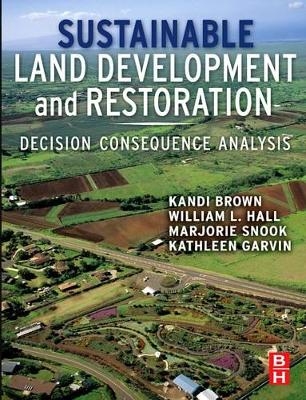
Sustainable Land Development and Restoration
Decision Consequence Analysis
Seiten
2016
Butterworth-Heinemann Inc (Verlag)
978-0-12-810195-7 (ISBN)
Butterworth-Heinemann Inc (Verlag)
978-0-12-810195-7 (ISBN)
Decision Consequence Analysis (DCA) is a framework for improving the quality of decision results. The framework is a systematic, multi-criteria quantification of uncertainties and the opportunities for managing and reducing the potential negative consequences of such uncertainties. DCA is demonstrated throughout Sustainable Land Development and Restoration for each stage of system based management of environmental issues. DCA links disciplines and incorporates components of risk modelling, probability modelling and the psychology of decision making. Its goal is to provide a comprehensive unbiased decision making framework. Its foundation is accurately defining your problem statement and clearly vetting your objectives to build a structure for meaningful analysis of data. Employment of DCA consistently throughout the environmental industry can reduce decibel-driven, agenda-laden decision making, streamline expenditure of resources (financial, human, natural), and provide a clear path to the sustainable maintenance of balanced environmental systems as the penultimate objective.
Sustainable Land Development and Restoration provides a toolbox to both the novice and experienced environmental practitioner of valuable techniques for addressing site specific environmental issues, as well as managing a portfolio of liabilities on an international scale. Ultimately, the authors are addressing the critical issue of balancing environmental asset balance sheets, whether on the scale of an individual project, across a company's portfolio, or for a community. The environmental manager who adopts the principles in this book will have greater confidence that environmental protection or restoration activities are providing measurable utility. The goal is that, through multidimensional resource management analysis and practices companies and societies can achieve sustainable maintenance of a balanced environmental system.
Descriptions of technical, contracting and implementation processes are supported by detailed case studies to provide real world context rather than an academic exchange of theories.
Sustainable Land Development and Restoration provides a toolbox to both the novice and experienced environmental practitioner of valuable techniques for addressing site specific environmental issues, as well as managing a portfolio of liabilities on an international scale. Ultimately, the authors are addressing the critical issue of balancing environmental asset balance sheets, whether on the scale of an individual project, across a company's portfolio, or for a community. The environmental manager who adopts the principles in this book will have greater confidence that environmental protection or restoration activities are providing measurable utility. The goal is that, through multidimensional resource management analysis and practices companies and societies can achieve sustainable maintenance of a balanced environmental system.
Descriptions of technical, contracting and implementation processes are supported by detailed case studies to provide real world context rather than an academic exchange of theories.
Part One: FOUNDATION FOR DECISION MAKING1.Defining Problem and Objectives 2.Data Management and Mining3.GIS 4.Remote Sensing 5.Statistics6.Forensics Analysis7.Risk AnalysisPart Two: DECISION ANLYSIS8.Alternatives Analysis - Billy9.Uncertainty and Tradeoff Analysis 10.Robust Performance Metrics11.DCA Model Construction Part Three: DECISION IMPLEMENTATION12.Sustainable Diverse Stakeholder Engagement 13.Implementation ToolsPart Four: SUSTAINABLE LIABILITY MANAGEMENT14.Portfolio Risk Management Analysis 15.Environmental Balance Sheet
| Erscheinungsdatum | 07.07.2016 |
|---|---|
| Verlagsort | Woburn |
| Sprache | englisch |
| Maße | 191 x 235 mm |
| Gewicht | 950 g |
| Themenwelt | Naturwissenschaften ► Biologie ► Ökologie / Naturschutz |
| Naturwissenschaften ► Geowissenschaften ► Geografie / Kartografie | |
| Recht / Steuern ► EU / Internationales Recht | |
| Recht / Steuern ► Privatrecht / Bürgerliches Recht ► Sachenrecht | |
| Technik ► Bauwesen | |
| Technik ► Elektrotechnik / Energietechnik | |
| Technik ► Umwelttechnik / Biotechnologie | |
| Weitere Fachgebiete ► Land- / Forstwirtschaft / Fischerei | |
| ISBN-10 | 0-12-810195-4 / 0128101954 |
| ISBN-13 | 978-0-12-810195-7 / 9780128101957 |
| Zustand | Neuware |
| Haben Sie eine Frage zum Produkt? |
Mehr entdecken
aus dem Bereich
aus dem Bereich


